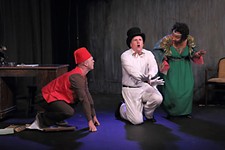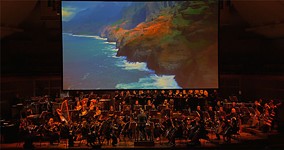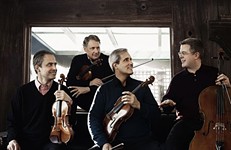The Trojan Women: A Love Story
Local Arts Reviews
Reviewed by Robi Polgar, Fri., Oct. 31, 2003
The Trojan Women: A Love Story
B. Iden Payne Theatre, Oct. 25Charles L. Mee is a prolific playwright whose work has been appreciated by increasing numbers of theatre makers over the past decade. Locally, the Rude Mechanicals and Zachary Scott Theatre Center have staged his Big Love and Limonade Tous Les Jours, respectively, offering intriguing and fancy-tickling glimpses of Mee's iconoclastic, theatrical storytelling. Mee's plays invariably combine overt sexuality and intricate politics with a whimsical panache and a flair for the make-believe made real. Words and ideas cascade out of characters, and wordplay is as rife in a Mee work as physical play. Not only are his works challenging for the performers, who must wrap their minds around contradictions and massive, intelligent prose, they are equally challenging for directors and designers, asking for imaginative solutions to his wild ideas of place, time, and style.
With so much raw material then, a Chuck Mee play is a veritable playground for young artists, and so it was for student artists of the UT Department of Theatre & Dance, which produced this latest local display of the playwright's unique and extraordinary vision. This time the subject matter was Troy, familiar dramatic ground where Queen Hecuba and a handful of women survivors mourn the loss of family, city, and civilization at the brutal hands of the invading Greek army. The story is hard, the central question posed: "What happens after the battles of a war are over?" Much like the survivors and invaders in the contemporary, lingering nastiness in Iraq, the Trojan women and their captors come to realize that brutality doesn't end with the official cessation of hostilities -- brutality continues in ways large and small, destroying the souls of the perpetrators of postwar crimes, as well as those of their victims. Mee's take on this is complex, exploring issues of sexuality and politics and basic human cruelty, especially in the Troy-based first act. The second act shifts 180 degrees to an island paradise where soldiers are welcomed by the female inhabitants of a rather permissive society, although the outright lustiness takes yet another turn for the political jugular in a surprising, brutal way. This overall brutality is tempered (if you can call it that) by silly little love songs, sung by women in the cast and performed by a pianist. Tossing in such frivolity amid all that horror is shocking. But it didn't work.
It didn't work, not because it was so jarring, but because the young artists of the production weren't capable of breaking into and out of such wildly swinging moods. Technically it seemed beyond them. The strain was evident as the women launched into "I'm Forever Blowing Bubbles" or "Look for the Silver Lining" or "How'd You Like to Spoon With Me" -- numbers that were sung well, but founded on nothing more than misery. The Trojan Women is a litany of woe, but Mee's script has the potential for much more; the young artists worked hard, but only scratched the surface of his work.
Director Amy Steiger made bold choices, but, ultimately, her stagecraft obscured her storytelling. A lot of thought and effort went into this production, but simple things such as ineffective blocking let the play down -- artificial character movement created good-looking stage pictures but eroded the impact of direct, personal confrontation. Placing Talthybius, the Greek bureaucrat in charge of Troy, on a genie lift might be a telling metaphor for his assumption that he is above the fray, but it weakened any interaction between the man and the women he was lording over.
Similarly, the second act -- more the brutality of love than the brutality of war -- dissolved into long-winded confusion. While frivolous and madcap with bright colors and silly antics (kudos to costume designer Blair Hurry for her distinction between the olive-drab grimness of Hecuba's Troy and the pastel buoyance of Dido's delectable island), ultimately the act just dragged. Love and war invite horrible endings, and even in survival there is a heavy price to pay. Mee's play makes the point incisively, uncomfortably, but entertainingly. This UT production, ambitious though it was, only nicked those three targets.










